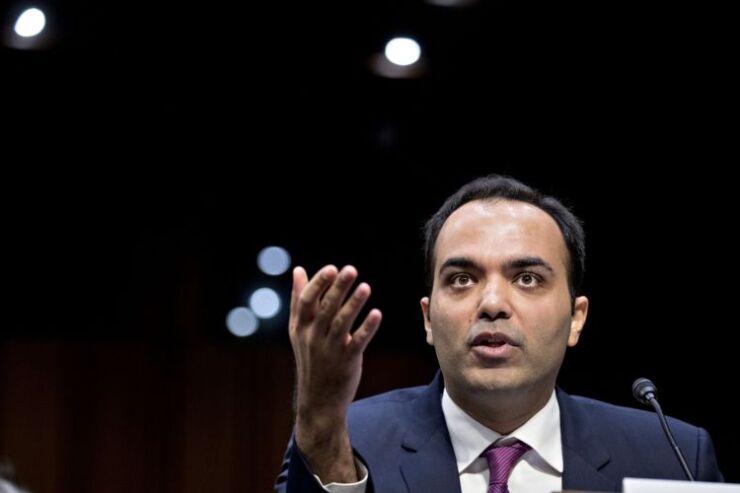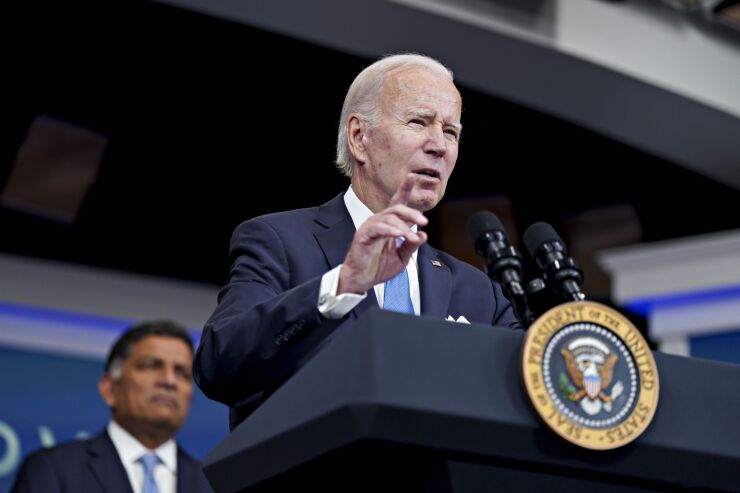Leading up to the midterm elections, President Biden shared the stage with Consumer Financial Protection Bureau Director Rohit Chopra, where both touted the elimination of bank "junk" fees as an example of how Democrats were working to lower costs for consumers.
The political stagecraft — at a White House press conference coupled with official statements by both the White House and the CFPB — has thrown banks and financial institutions into legal turmoil. By targeting so-called "unfair" bank fees, Biden and Chopra have sought to single-handedly expand a law that banks and business trade groups have been fighting against for 40 years: the federal prohibition on "unfair, deceptive and abusive acts and practices," known as UDAAP.
Bankers claim that the CFPB issued nonbinding guidance on so-called "unfair" bank fees and that the White House

"Even though the CFPB's guidance is not legally binding as a formal matter, if a company chooses not to change their behavior, the CFPB can later examine or investigate the company and allege that it was committing unfair practices and knew about it," said John Coleman, a partner at Buckley and a former CFPB deputy general counsel for litigation and oversight.
The CFPB said that its
According to the CFPB's own
"The monetary risk of a company ignoring the CFPB's guidance is so immense that companies have a strong incentive to follow it and few reasonable options for recourse if their interpretation differs from the bureau's," said Coleman, who was one of the first employees to join the CFPB after its creation in 2010 by the Dodd-Frank Act. "A company with principled and reasonable disagreements with the CFPB will have to think carefully about whether to accept the risk of losing in court, even if that risk ought to be pretty low."
Another key problem for financial firms is that litigation over the CFPB's efforts to extend its authority over UDAAP will not be resolved any time soon. In September, the U.S. Chamber of Commerce, the American Bankers Association and the Consumer Bankers Association
The CFPB is expected to respond to the trade groups' lawsuit by the end of November, lawyers said. The litigation may be on hold for at least a year because a federal appeals court ruled earlier this month that

Many bankers and trade groups said that banks now are trying to figure out if they are treating all customers fairly even though no tests actually exist to determine with any accuracy what constitutes fairness. Bankers have long claimed that UDAAP is subjective and that the CFPB has failed to create specific language or bright lines to give banks certainty about how to act and comply. Any disparity in the treatment of customers on any financial product now could be considered evidence of discrimination against certain protected classes, experts said.
"It's a challenge," said Ken Meiser, vice president of market and industry insights at LexisNexis Risk Solutions, a unit of LexisNexis, the data and analytics company in Alpharetta, Georgia.
The path the CFPB and White House have taken on rooting out discrimination in all financial products has forced many banks to ramp up the use of so-called regression analysis and other tools to determine if all customers are being treated equally. As an example, if a consumer incurs a late fee on a credit card and calls a bank to ask that the late fee be removed, a company may no longer be able to use their discretion to waive the fee based on a customer's payment history or other factors because doing so may mean other customers are not getting the same benefit and may face unfair treatment, experts said.
A core argument against the CFPB's novel approach to expanding UDAAP is that Congress has specifically outlawed discrimination in housing, credit and employment — but not in all financial products, an issue the banking industry has raised as a defense against the CFPB's recent actions.
"Congress was very thoughtful in the 1970s when they wrote most of the existing consumer protection laws and they limited jurisdiction of discrimination cases to the Equal Credit Opportunity Act and the Fair Housing Act," said Catherine Brown, a partner at Klaros Group, a financial services advisory and investment firm. "There's an apparent contradiction between the bureau's commitment to transparency and their willingness to expand their authority so profoundly. They have completely extended their authority to an entirely new set of products and did so without providing the industry the ability to comment through the normal administrative rulemaking process."
The move by the CFPB marked a departure from existing anti-discrimination laws, Brown said. The 1968 Fair Housing Act and 1974 Equal Credit Opportunity Act are both landmark civil rights law that ban discrimination in housing and against credit applicants. The bureau has jurisdiction over ECOA while the Department of Housing and Urban Development oversees fair housing laws.
The upshot of the changes to UDAAP means that banks and financial firms now are running tests to determine if there is discrimination in noncredit products. The CFPB opened itself to criticism and further congressional inquiries back in 2015, when the bureau's own internal documents revealed that the technology used to determine discrimination in auto lending
Banks say they are damned if they comply and damned if they don't under the new policies because the CFPB will ask for proof that they have procedures in place to detect discrimination and will demand to see the results, which banks claim are unreliable and skewed. If companies opt not to use the analytical tools, they also could face potential fines and penalties for failing to do so.
"Industry can either choose to get in line or take their chances," Coleman said. "That's the world we're living in."





